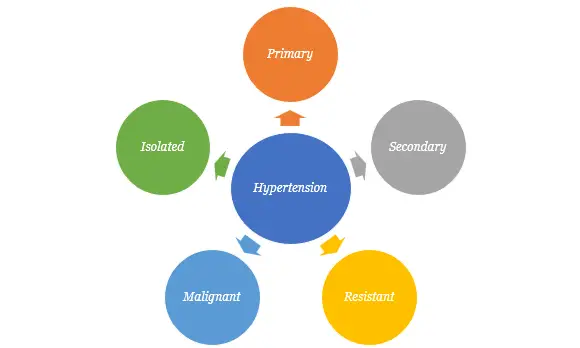
Hypertension is a long-lasting health condition and has become one of the major causes of untimely deaths worldwide. Hypertension shows little or no symptoms and is a common risk factor for health conditions like cardiac arrest, stroke and kidney failure. In today’s era, most of the people follow unhealthy lifestyle along with poor diet and this has become the leading cause of hypertension. According to WHO (World Health Organization), approximately, 1.28 billion of people aged between 30-79 years globally are suffering from hypertension.
What is Hypertension?
Hypertension is also known as High Blood Pressure. Before understanding High Blood Pressure, lets discuss in brief about blood pressure. Blood Pressure is the pressure applied on the walls of the arteries during the pumping of blood in the body. Now, Hypertension or High Blood Pressure is a health condition in which pressure of blood rises than normal against the walls of your arteries. There is fluctuation in blood pressure levels during the day but if it remains high for long time, then it can cause serious health complications.
How Blood Pressure is Measured?
The Measurement of Blood Pressure involves 2 readings which are as follows;
- Systolic Blood Pressure – Systolic Blood Pressure is the maximum pressure of blood measured during the tightening of the ventricles. The upper number recorded during the measurement of blood pressure while heart beats.
- Diastolic Blood Pressure – Diastolic Blood Pressure is the minimum pressure of blood recorded after the contraction of ventricles. The lower number recorded during the measurement of the blood pressure in between the heart beats and when your heart is at rest.
The reading of normal blood pressure is 120/80 mm Hg in which systolic blood pressure is 120 and diastolic blood pressure is 80.
What are the symptoms of Hypertension?
There are no visible symptoms of hypertension during the early time. Symptoms usually occurs when the blood pressure rises to 180/120 or more. The common symptoms of high blood pressure are;
- Chronic Headaches
- Pain In Chest
- Vertigo Or Dizziness
- Trouble In breathing
- Nausea/Sickness or Vomiting
- Distorted Or Blurred Vision
- Anxiety Or Nervousness
- Confusion
- Buzzing Sound in The Ears
- Bleeding In the Nose
- Irregular Heart Tempo or Beats
What are the different types of Hypertension?

There are different types of high blood pressure according to the different signs and symptoms. The common types of hypertension are as following;
- Primary Hypertension: It is also known as Essential hypertension. It usually occurs in adults and has no identifiable cause yet. People who visit doctor and recorded with three or more times high blood pressure falls under this category.
- Secondary Hypertension: It is caused due to another health conditions such as sleep apnea, fluctuations in hormones, adrenal gland diseases, thyroid disorder or in case of high intake of salt in your diet or even after the intake of few medications.
- Resistant Hypertension: Resistant Hypertension is not curable with any medical treatment. In this condition, there are high chances of stroke, risk of heart failure, kidney disease. Factors like missing dosage of medications or bad lifestyle habits contribute to the rise in high blood pressure.
- Isolated Hypertension: Isolated Systolic Hypertension is recorded when the arteries become less flexible and as a result there is increase in chances of cardiac arrest (Heart Attack).
- Malignant Hypertension: This is a very rare type of hypertension and young adults or women with pregnancy toxaemia are more susceptible to malignant hypertension. It needs instant medical treatment.
What are the causes of Hypertension?
Up to 95% cases of hypertension are classified as primary hypertension. While this type of high blood pressure is characterised by having no known cause, there are certain risk factors that make you more likely to develop it.
The possible causes of hypertension may include:
- Age Factor: People aged more than 60 years are more susceptible to the occurrence of hypertension.
- In Born Health Conditions: Prenatal or in born health conditions like Down’s syndrome or Cushing’s syndrome can result in hypertension.
- Hereditary Factors: If you have family history of high cholesterol and hypertension, then you are at risk of getting hypertension.
- Medical Conditions: Some of the medical conditions that can affect your kidney and hormonal imbalance can cause hypertension.
- Medications: Few Medications or drugs like steroids, birth control pills, pain killers, anti-depressants or other herbal remedies which contain liquorice can result in hypertension.
What are treatment options for Hypertension?
Usually, the doctor will diagnose if you are hypertensive or not. After the evaluation, your doctor will prescribe the right medication or treatment for hypertension according to your age and other health factors.
- Lifestyle Modifications such as adapting healthy lifestyle, quitting smoking, tobacco, alcohol etc can decreases the risk of hypertension.
- Dietary Changes like intaking low salt diet or taking proper healthy diet plan can treat hypertension.
- Medications such as antihypertensives, ACE inhibitors, Calcium Channel Blockers, Diuretics can help in the management of hypertension.
- Physical Exercises or yoga can help you to lose weight if you are overweight. With regular exercise, your body will start functioning properly and with healthy diet, you can treat hypertension.

 Universal - go to homepage
Universal - go to homepage

